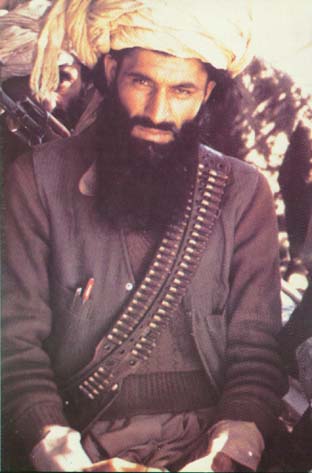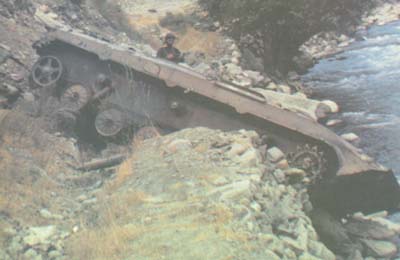Robert Canfield
This spring Robert Canfield is travelling to Pakistan and,
if internal fighting subsides, to Afghanistan. The purpose is to
update his information on Afghan religio-political institutions,
which he has been studying since 1966. The information will
enable him to update and correct, in a final revision, a book now
nearing completion, and to augment his information on the
Ismailis, a topic which will be the object of his next writing
project.
 The book currently nearing completion examines the social
and political influence of Islamic "saints" in Afghanistan.
"Saints" -- Islamic specialists [pirs, ruhani] believed to
have unique spiritual powers -- can be politically influential in
Afghanistan, as they are the foci of informal networks of
"friends" who in times of crisis may form into broad-based
political coalitions. In the recent civil war, for instance,
"saint networks" comprised the cores of two of the major
"political parties" formed to resist the Soviet-supported Marxist
regime in Kabul; also, the family of one of the two Ismaili
"saints" in the country, along with their Ismaili followers,
provided the core of a powerful pro-government militia. What has
been different about these organizations in the recent civil war
is that they have not been overtly religious, but formed as
political or military coalitions.
The book currently nearing completion examines the social
and political influence of Islamic "saints" in Afghanistan.
"Saints" -- Islamic specialists [pirs, ruhani] believed to
have unique spiritual powers -- can be politically influential in
Afghanistan, as they are the foci of informal networks of
"friends" who in times of crisis may form into broad-based
political coalitions. In the recent civil war, for instance,
"saint networks" comprised the cores of two of the major
"political parties" formed to resist the Soviet-supported Marxist
regime in Kabul; also, the family of one of the two Ismaili
"saints" in the country, along with their Ismaili followers,
provided the core of a powerful pro-government militia. What has
been different about these organizations in the recent civil war
is that they have not been overtly religious, but formed as
political or military coalitions.
Information specifically on the Ismailis of Afghanistan will
be useful in his next writing project. That topic has been taken
out of the current manuscript to reduce its length. Together
with material collected in earlier visits [1966-68, 1989] the new
material will be extensive enough to produce a separate [perhaps
book-length] study. The main focus will be the public revelation
in the 1950s that a prominent "saint" and his followers were
secret worshippers of the Aga Khan, and thus Ismailis. Ismailism
is generally despised among the Afghans, most of whom are Sunni
Muslims, but it is especially so among the minority Shia, among
whom the [secret] Ismailis had been intermarrying. The public
exposure of the Ismailis rent apart many communities in Bamian,
central Afghanistan, where Canfield did his original field work.
The occasion of this exposure and the events that resulted from
it will be the main concern of the next writing project.
Because political circumstances have changed since the earlier
field work he is now more free to reveal details about the Afghan
Ismailis than previously, when they were being persecuted. To
the early material he plans to add information on what has
happened to the Afghan Ismailis since then, based on interviews
collected during a stay in Pakistan in 1989, and on interviews
during his projected field trip this spring. The Ismailis, since
becoming public, have been a small but organized social force in
the country, and they continue to play a strategic role in its
still fluid political affairs.
 Having supported the Marxists
during the recent civil war, they helped form a new coalition
made up of former Marxists and resistance fighters as the Kabul
government collapsed in 1992. Now, the society is divided into
several unstable factions, and the Ismailis are faced with
special threats and challenges that Canfield hopes to learn more
about during the proposed visit.
Having supported the Marxists
during the recent civil war, they helped form a new coalition
made up of former Marxists and resistance fighters as the Kabul
government collapsed in 1992. Now, the society is divided into
several unstable factions, and the Ismailis are faced with
special threats and challenges that Canfield hopes to learn more
about during the proposed visit.
 The book currently nearing completion examines the social
and political influence of Islamic "saints" in Afghanistan.
"Saints" -- Islamic specialists [pirs, ruhani] believed to
have unique spiritual powers -- can be politically influential in
Afghanistan, as they are the foci of informal networks of
"friends" who in times of crisis may form into broad-based
political coalitions. In the recent civil war, for instance,
"saint networks" comprised the cores of two of the major
"political parties" formed to resist the Soviet-supported Marxist
regime in Kabul; also, the family of one of the two Ismaili
"saints" in the country, along with their Ismaili followers,
provided the core of a powerful pro-government militia. What has
been different about these organizations in the recent civil war
is that they have not been overtly religious, but formed as
political or military coalitions.
The book currently nearing completion examines the social
and political influence of Islamic "saints" in Afghanistan.
"Saints" -- Islamic specialists [pirs, ruhani] believed to
have unique spiritual powers -- can be politically influential in
Afghanistan, as they are the foci of informal networks of
"friends" who in times of crisis may form into broad-based
political coalitions. In the recent civil war, for instance,
"saint networks" comprised the cores of two of the major
"political parties" formed to resist the Soviet-supported Marxist
regime in Kabul; also, the family of one of the two Ismaili
"saints" in the country, along with their Ismaili followers,
provided the core of a powerful pro-government militia. What has
been different about these organizations in the recent civil war
is that they have not been overtly religious, but formed as
political or military coalitions. Having supported the Marxists
during the recent civil war, they helped form a new coalition
made up of former Marxists and resistance fighters as the Kabul
government collapsed in 1992. Now, the society is divided into
several unstable factions, and the Ismailis are faced with
special threats and challenges that Canfield hopes to learn more
about during the proposed visit.
Having supported the Marxists
during the recent civil war, they helped form a new coalition
made up of former Marxists and resistance fighters as the Kabul
government collapsed in 1992. Now, the society is divided into
several unstable factions, and the Ismailis are faced with
special threats and challenges that Canfield hopes to learn more
about during the proposed visit.